
by Victoria Lucas
No.
No, no, no, no. no. I don’t believe it, can’t believe it, am not going to believe it.

Paul McCartney
Longer than the road that stretches Out ahead."
Continue reading [May 24, 1970] Let It Be (The Beatles break up)

by Victoria Lucas
No.
No, no, no, no. no. I don’t believe it, can’t believe it, am not going to believe it.

Paul McCartney
Continue reading [May 24, 1970] Let It Be (The Beatles break up)

by Victoria Lucas
OK, kiddies, the word for today is ARPANET. Well, yes, good point, it’s not a word, is it? It’s an acronym jammed into an abbreviation. But a juicy one.
I found out what it means because Mel (my husband) and I have these friends in Orinda, California (a town east of Berkeley, nice place). Sharon is more of a stand-up comedian than a housewife, who uses her housewifery–-and sometimes herself–-as the butt of her jokes. Dick Karpinski is a fuzzy bear of a man who is the first computer programmer I ever met. We don’t get to their place too often, since it’s off our beaten track between SF/Berkeley and Fortuna that we usually run on the weekends and holidays (or when neither of us has an active temp job in the Eureka area).
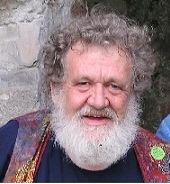
Richard Karpinski works for the University of California at San Francisco, supporting users of the IBM 360 and other tasks
At a recent visit, Dick was quite excited, and Sharon was complaining about her “three years of back ironing.” I don’t have much to say about the ironing, but once Dick had explained to me the reason for his excitement I admitted to some buoyancy myself. I wonder how you will feel about it.
With its initial transmission in October last year, ARPANET (Advanced Research Projects Agency Network) is the first large-scale, general-purpose computer network to link different kinds of computers together without a direct connection. Not only that, but different kinds of networks are coming online following this one. But who cares, right? I mean who of us has ever even seen a computer?
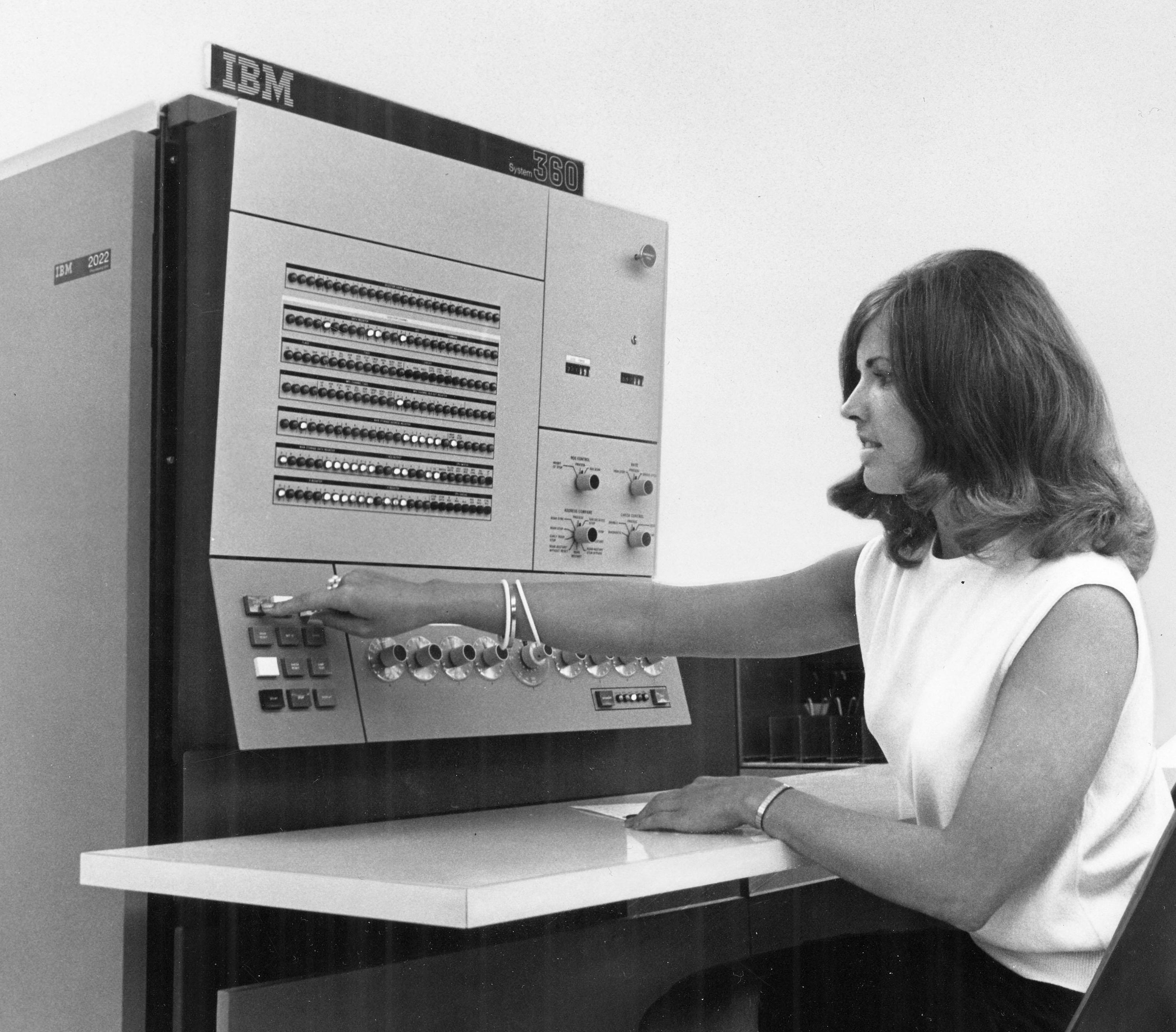
The IBM 360 with operator
FAR OUT!
Up to now you could only connect the same kind of computers, and then only by special-purpose cables and outlets in the same building, unless you could connect your computer to a "modem” (modulator-de-modulator) that converts digital (computer talk) to analog (telephone signaling) and back again when connected to your telephone line. The same protocols and hardware can connect a computer to “terminals,” boxes that can interact with a computer but do not have the smarts to actually process data. Multiple people could use the same computer at the same time (the miracle of "time sharing" that Ida Moya talked about a few years back, but again, only at the same site or by telephone. No matter what, connections were direct: point to point and dedicated. If you wanted to interact with another computer, you had to go to another terminal hooked up, directly or via modem, to the new machine.
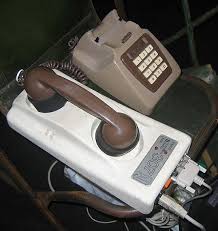
An electronic translator of one type of signal to another, the modem
But what if you wanted to access multiple other computers from a single terminal? What if you wanted your computer to talk to another, farflung computer of a different make (ie connect an IBM to a CDC?) Here’s where Dick had to bring out his yellow pad and start writing and drawing.
Dick draws a box on his pad. “One computer, right?”* he says. “And here’s another” as he draws another box to make #2. Now you could connect a single terminal to any number of computers using a newly developed "protocol" for connection. (A protocol, drawn as lines from that word toward the boxes, is a set of rules or instructions about how to do something, and it’s above a program, which is more of a detailed list of steps to use when doing something.) Rather than using specific hardware, the protocol allows computers to "speak" a common language, over phone-lines lines… regardless of computer make or location!
As Dick, the “Nitpicker Extraordinaire,” might have written at the top of his pad (I’m a little fuzzy about how the conversation progressed), the first set of computers involved in the evolution of this network would have belonged to the US Department of Defense as part of its Advanced Research Projects Agency (ARPA), an almost direct result of the success of Sputnik. When NASA (National Aeronautics and Space Agency) was formed in 1958, most of ARPA’s projects and funding were moved to that group. That left ARPA with high-risk or far-out projects, such as computer networking. I can't tell you which computers are involved, nor the details of the protocol (even if I understood them) because they're classified. The main reason for the ARPA network is to test the survivability of communications in the event of a nuclear war. Because if one big computer is destroyed, someone could just use their terminal to contact a different one to complete a process.
Talk to any computer anywhere, without a telephone

An ARPANET processor
While this exciting technology is limited to the ARPA for the moment, technology tends to spread to civilians eventually. Just think about it! The ARPA network and others like it will make it possible to distribute programs and data widely without printing it out and mailing it. As long as a computer can talk back, you can get and send data from and to it. Even more amazing, the initial transmission speeds showed that messages were being sent to a place 350 miles away 500 times faster than local data was traveling before. It was so fast that the initial speed caused a system crash, followed by a rebuild to handle the velocity, all during the very first transmission. It's not faster than light, but it's a darn sight better than having a computer operator working on far-out national research projects for ARPA fall asleep on his or her keyboard waiting for an answer.
What miracles could you work with a fast, smart, terminal that could connect to any computer in the world? Now that’s exciting!
*To Dick’s other friends. Yes, I know Dick, but I don’t remember any specific conversation like this. Any mistakes or misrepresentations are my responsibility.
[New to the Journey? Read this for a brief introduction!]

by Victoria Lucas
Good news!
Remember when last year (December 12, 1968) I reported that the submersible Alvin had sunk at around 5,000 feet in the Atlantic Ocean, with bad weather curtailing the search for it?
 The Alvin
The Alvin
With money provided by the US Navy, whose vehicle the Alvin is, and who expected to learn whether and how such retrievals might be done, Alvin's caretakers sailed out armed with imaging tools and images, along with equipment and engineers to find and raise the submersible. They succeeded on their Labor Day cruise!
Fortunately for its seekers, the Alvin had landed on the ocean floor right side up, gaping open, so a special tool was lowered into it and remotely sprung open to hold it while it was slowly raised and then towed close to the surface back to Woods Hole Oceanographic Institution. Great care was taken not to disturb the ocean life that had inhabited it, and that was removed and taken to labs for observation, etc.
There was one funny incident: an engineer who had been on the Alvin's host ship on the last trip before its loss and was also on its Labor Day tow ship came back (like most crew) hungry. He accepted a seafood sandwich from the welcoming spouse of a crew member, and while he was eating it a picture was snapped of him with the sandwich. Coincidentally the lunchbox left behind when the Alvin had slipped into the ocean was in the picture.
And someone interpreted that to mean that the engineer was eating the sandwich that had been in the lunchbox (along with an apple) while the submersible was beneath the waves for 9 months. Immediately there sprang up a certainty that the ocean had hitherto unknown powers of preservation. The last I knew someone was talking government grants.
Now for the main event!
No Separate Beds (Review of "Bob & Carol & Ted & Alice")
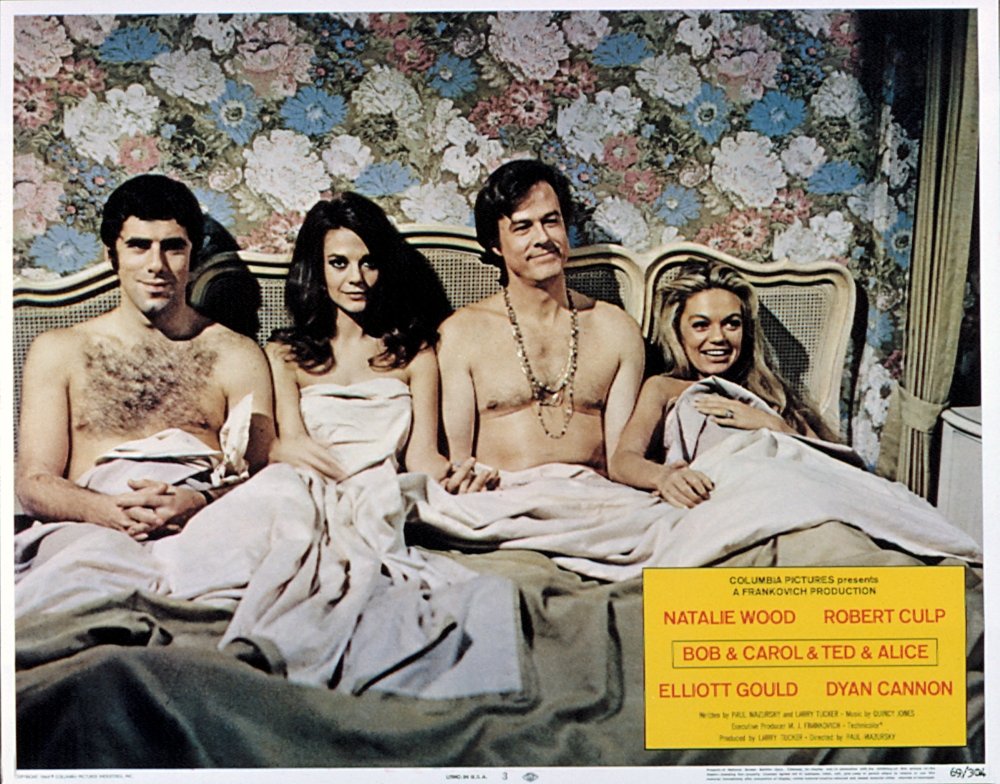
Poster showing Gould, Wood, Culp & Cannon as the eponymous characters
Well, I'll be! Someone up and wrote a film script about upper middle-class couples behaving like unsupervised teenagers. (I would have said "well-to-do couples," but that's a bit old-fashioned of me.)
If you've seen the latest Mad Magazine (and I know some of you have) you've essentially seen the above poster for "Bob & Carol & Ted & Alice"–Robert Culp of "I Spy" resting apparently naked against the headboard of a bed with Dyan Cannon, Elliott Gould, and Natalie Wood, all covered by strategic bits of bedding. (The same artist did both the parody and the original poster.)
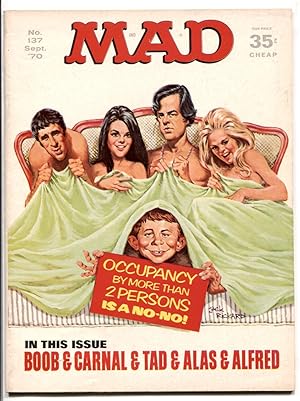
The MAD version of the movie poster
At the beginning of the movie, there are Bob & Carol in his sports car driving through beautiful countryside to an expensive retreat they call "The Institute" (a stand-in for Esalen, a school at the vanguard of the "Human Potential Movement"). After a dramatic group therapy "marathon" session we see them and their friends Ted and Alice, back home eating out at a fancy restaurant, living in beautiful masonry shelters (no doubt in nice neighborhoods), consulting an expensive psychoanalyst (the writer/director/producer's real psychoanalyst by all accounts), and experiencing great angst.
Is the angst political, about how many resources they're using up and how they should be giving back? Is the angst medical, cares about health, death and life? No. It's highly personal and laced with guilt. Guilt about political or family matters? No–politics are never discussed, and each couple has one child who is not the center or even (it seems) an important focus of their lives. Like them, each child is privileged and loved and free, even if spending many evenings and weekends with Spanish-speaking help rather than their parents, "extended" families such as grandparents (who probably live far away), or other children.
So why the angst? The joy in the opening music (Handel's "Hallalujah Chorus") comes in anticipation of received wisdom, which appears to them in group therapy to be the practice of honesty, and in some of those honest moments they realize that . . .
They aren't having enough sex.
But I shouldn't make fun of them. They just want what every teenager wants: the privacy and the time to explore–him- or herself as a psychological being, and him- or herself as a sexual being.
Perhaps I should be asking why it took them so long. I think we all know the answer to that: because they weren't allowed to explore when they were teenagers (although a minority of this generation did manage to be either secretive or untruthful enough to get away with it). Think of the kids you know who got married while in high school–or were you one of those youngsters yourself?
I think these wealthy adults (all four starring actors in their 30s, fitting the characters they play) were waiting for the sexual revolution now in progress. They were waiting for permission. Now they have it.

Just in case the movie isn't enough for you
So we have gone from Ricky and Lucy Ricardo sleeping in separate beds while a married couple, never showing Doris Day in bed with anyone but a voice on a telephone, and generally strict rules about how sexual behavior is suggested in non-pornographic films, to: wham! two couples in bed together—albeit just sitting there after a brief bout of playing hide and tickle.
In their innocence they call their foursome an "orgy." I wonder what the scriptwriters, Paul Mazursky and Larry Tucker would have done with the group hosting weekly orgies whose members I'm now interviewing for my book. Probably discarded us as an extreme manifestation of the sexual revolution and gone back to using improvisation (by writers only) as a tool for generating dialog (a rumored way of writing the scene with Ted and Alice in which he is horny but she is not).
The film ends with the Burt Bacharach song "What the World Needs Now." As it plays, a crowd of people practice a tool for freedom they can exercise while fully clothed, whatever they mean by it, "love." But wait! There's still the book!
This is a comedy without very much laughing out loud. If you are not offended by the very premise of it, I think it might amuse you. I give it a 4 out of 5 mainly for excellent comedic acting and witty writing.

by Victoria Lucas
Full Disclosure
I’m going to have some fun with this, and I hope you do too. Some of you may remember that I pitched a TV show called “Laugh-In” on May 4, 1968. Although I initially experienced the show on FM radio, lacking a TV but having a local TV station with a frequency reachable on my FM dial, I have actually watched the show on the TVs of friends every chance I’ve had. This movie was a treat for me.
"The Maltese Bippy"
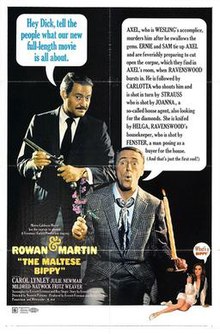 Poster for “The Maltese Bippy”
Poster for “The Maltese Bippy”
This seems to be the only movie so far with “Maltese” in its title that is not an adaptation of the Dashiell Hammett detective novel, The Maltese Falcon. “The Maltese Bippy” is a movie starring Dan Rowan and Dick Martin clearly made in the hopes of taking advantage of the popularity of their comedy team in the TV weekly show “Rowan & Martin’s Laugh-In.” “Bippy” is a catchphrase of that show that might refer to anything from something Dick Martin is “betting” to a Bippy Burger served at one of a chain of Laugh-In restaurants, or something offered in exchange by Sammy Davis, Jr. for his “wagon.”
It is called a horror-comedy, spoofing movies like “Blood of Dracula’s Castle,” and it portrays Dick Martin as a werewolf-in-training. It is also rated as a “mystery,” with the team splitting up, Rowan hoping to take monetary advantage of Martin’s expected transition to lycanthropy, as well as a woman among the neighbors whom Rowan hopes to sign as a performing werewolf herself, as Martin pursues the question of why their neighbors have masqueraded as werewolves and taken an interest in him and his home.

TV show title with typical curtain style
The movie is identifiable as having the “Laugh-In” style of rapid-fire delivery as well as the show’s way of mocking everything: the duo can’t even let the titles go by at the beginning without appearing beside them and making fun of them, and the last moments of the film are no less flippant than the first. But it proceeds Without (and this is a big W) the political commentary that we’ve grown used to on their shows.

Scene from "Once Upon a Horse"
This was not their 1st movie—the pair starred in “Once Upon a Horse” in 1958, 6 years after they began their comedy partnership as a nightclub act, and 9 years before the pilot of “Laugh-In.”

Dan Rowan on "Rowan & Martin's Laugh-In"
Daniel Hale Davis (“Dan Rowan”) became an orphan at 11 after traveling with his parents in a carnival. He was seen through high school by a foster family, then hitchhiked to Los Angeles, where he worked in the Paramount Studios mailroom. He next served as a fighter pilot in WWII, being awarded medals for his service. After the war, he returned to Los Angeles and got together with Dick Martin, with Martin starting out in the “straight man” role in their nightclub act, which worked better when they switched, allowing Martin to get the laughs.

Dick Martin on "Rowan & Martin's Laugh-In"
Thomas Richard Martin ("Dick Martin"), on the other hand, spent his ordinary childhood in Michigan, and survived an infection with tuberculosis that kept him out of the military. His first job in entertainment was as a writer for a radio sitcom that I remember listening to, “Duffy’s Tavern.” (It always began with an actor answering a phone with: “Duffy’s Tavern, where the elite meet to eat. Duffy ain’t here”—Duffy never does appear.) Martin was also in the movie "Glass Bottom Boat," a comic spy movie with Doris Day (1966). He was working on "The Lucy Show" (since 1962) when "Laugh-In" came along and proved itself to have legs, ending his appearance on that show in 1968.

Sammy Davis, Jr. as "da judge"
I was intrigued to remember that the original premise of the movie is based on the same story as a sketch in the March 17 “Laugh-in” show this year, performed by Rowan and Sammy Davis, Jr. (a regular guest known for prancing about chanting “Here come da judge” in a judge’s gown and antique wig, also in this show missing his "wagon"). In the TV sketch the two lament that their pornographic-film company is going bust and they will not be able to continue making movies without an injection of cash. In the movie, Rowan and Martin are ejected from their “studio” in an office building, in which they have been making soft pornography films, employing women who don’t know what they’re in for.

Martin's housekeeper played by Mildred Natwick, shown here in "The Trouble with Harry"
The pair move their office to Martin’s house, since he has been backing the enterprise with his money. The place has already been turned into a boardinghouse, to try to support the business and earn a living, and a beautiful young woman (Carol Lynley) is rooming there, as well as a suspicious young man (Leon Askin). After a murder occurs in the cemetery nearby some strange neighbors begin to come around. Martin’s housekeeper, played by Mildred Natwick, is justifiably suspicious of everybody, even Martin.
From Horror Movie to Mystery
Early on the movie appears to be rapidly developing into a horror movie with gags. But after a sufficiency of graveyard shots, a sequence intervenes that I would sit through the whole movie again just to watch: in a dream Martin sees himself in a bathroom mirror, turning into a werewolf before his eyes—a very good makeup job. As the wolf, he seeks help but only gets himself into more trouble, ending up in an old-time silent-movie-style chase being cranked too fast. Lynley comes to his aid and wakes him up, providing a transition from the horror comedy to a mystery story with now 2 murders to solve. Between this point and the end, a literal heap of murderers are dispatched and a man pretending to be a representative of the “Motion Picture Code” commands a policeman to arrest Rowan and Martin for “excessive violence on film.”
WARNING
This movie has 4 endings, no taste, and enough silliness for a truckload of stooges, but then that’s “Laugh-In,” isn’t it? And that’s why people like me (“Laugh-In” fans) go to see it. We want to see Dan Rowan and Dick Martin make fools of themselves and each other—and anyone else in range, such as their guest stars, who have so far included Tiny Tim, Garry Moore, Gina Lollabrigida, the Smothers Brothers, Mel Brooks, Hugh Hefner, Lena Horne, Rock Hudson, Jack Benny, Guy Lombardo, Liberace, Zsa Zsa Gabor, Johnny Carson, Marcel Marceau, Rod Serling, Jimmy Dean, Colonel Sanders, John Wayne, and Richard Nixon, to name a few.
If you are, like me, a fan of “Laugh-In,” by all means go and see it, and for you I would give the film 4 and a half stars out of 5. If you are not a fan, don’t bother, you will probably see it as maybe a 2 out of 5.

by Victoria Lucas
!NEWS BULLETIN!
Since those of you reading this might not be familiar with events in Berkeley, California, I thought I should report here the death of James Rector, a 25-year-old man shot by a sheriff deputy while on a roof watching the protest against the destruction of community improvements to a vacant lot belonging to the University of California, otherwise known as "People's Park."
Shot on May 15, he died on the 19th after several surgical attempts to repair vital abdominal organs damaged by the load of buckshot. A similar volley blinded another man, Alan Blanchard, on the same roof on the same day. If you have an urge to climb onto a roof to view a protest, suppress it. Law enforcement authorities do not recognize buckshot as lethal and are allergic to perceived threats from above. (I am quite opinionated about events like this. You may wish to seek other reports to obtain other views of the same events.) Below is a poem printed as a flyer, circulating on the streets now.

Michael McClure, "For James Rector"
We now return you to your regularly scheduled article

Cover of Ubik by Philip K. Dick
A Marathon Start
Beginning to read Philip K. Dick’s new book Ubik (1969, Doubleday) is like starting a marathon in the middle. Seeing other runners rushing by, you try to keep up, faster and faster, fearing to trip up. Not only does the book start in the middle of a crisis in what appears to be an important US company, but it also has a vocabulary full of made up words of which the meaning can only be inferred: “psis,” “teeps,” “bichannel circuits”; and the dead (if their relatives can afford it) are kept in “moratoriums” instead of crematoria or cemetaries. How can you keep up with things you can’t understand in a future you can only glimpse as felt by unfamiliar characters?
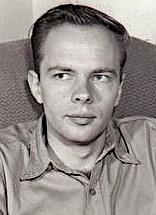
Author Philip K. Dick
Wondering if all Dick’s books are like this, I picked up library copies of his Eye in the Sky and The Cosmic Puppets (both 1957). The latter begins with a quiet, bucolic scene of children playing beside a porch. No rush. The former begins with an accident that causes injury, involving something called a “bevatron” and a “proton beam deflector.” No rush even there. For the most part, the vocabulary is ordinary in at least the beginning of these two. A little research turns up the fact that Dick first used the word “teep” (for telepath), for instance, in his story “The Hood Maker,” said to have been written in 1953, published in 1955, a year in which he used the same invented abbreviation in Solar Lottery.
Why is Ubik so different from other s-f books, even his own? Well, I had to persist to find out, and maybe you will too. I bet you’ll never guess where I found this book. I did not buy it. I found myself in a hand made hippie pad in the woods, dropped off by my husband Mel while he and one of the owners of the place went off to (I think) get wood for the winter. The other owner left with them or for some other errand, and I was alone in their kerosene-smelling dwelling, without anything to do. Wandering upstairs, I found bedding and pillows, and this book.

Not the actual house, but close
Since I hadn’t finished it by the time they returned, I borrowed it. This was the first really “science-fictiony” book I ever read. (I don’t count Flowers for Algernon, which I reviewed here on January 28, 1966, because that book has no assumptions out of the ordinary save one: that an experimental drug exists that can increase intelligence—no rocket ships, no bug-eyed monsters, no “vidphones.”)
Maybe Science Fiction Is Experimental Writing?
Anyway, persisting, I find myself in a future in which all the paranormal phenomena we humans have imagined are real and the foundation of industrial espionage and security, and the dead have a “half-life,” their brains wired into "consultation rooms" as their frozen bodies stand in caskets in a “moratorium," as above. The head of Runciter Associates, the company in crisis as above, must consult his dead wife Ella about the crisis. The “half-life” phenomenon, it is stated, “was real and it had made theologians out of” everyone. The citizens of this future are understandably prone to panic, to anxiety, to uncertainty.
Epigraphs for each chapter appear to be advertising for Ubik, which is variously represented as a “silent, electric” vehicle, a beer, a type of coffee, a salad dressing, a plastic wrap, etc. What is Ubik and where does it come from? No one knows. (Read the last epigraph in which it reveals its own nature to the extent it can.) Soon Runciter’s employees run into Pat, an “anti-precog.” It seems that she is an unusual practitioner of anti-precog[nition] in that she neither time-travels nor appears to do anything at all. But she changes the present and future by changing the past, leaving the affected people with little but (only sometimes) a trace memory of any previous present they have just experienced. Is all that strange enough for you? Wait! There's more.
There's Jory, dead at 15 years of age, who is on the wrong side of the struggle in the book between light, intelligence, and kindness, and greed, ignorance, and darkness. Keep an eye on him. His parents pay to keep his casket in the same areas as other "half-lifers," although his strong "hetero-psychic infusion" is clearly disturbing Ella Runciter and others.

Science-fiction satire?
Also keep in mind that in the previous year Kurt Vonnegut Jr.’s book God Bless You, Mr. Rosewater was published with a helmeted pig riding a unicycle on the cover and has been described as satire. Satire is seldom funny-ha-ha, but it is often funny. This book is occasionally funny-ha-ha, especially in the ridiculous clothing that appears to be popular in this dystopian future (1992).
For instance take this passage, in which an important space mogul enters wearing ”fuscia pedal-pushers, pink yakfur slippers, a snakeskin sleeveless blouse, and a ribbon in his waist-length dyed white hair.” OK, maybe that isn’t so far from what you might see now on Haight Street. But if this book were made into a movie, retaining Dick’s careful costuming would ensure it would be laughed off the screen.
The Cryonics Connections

Robert Ettinger in World War II uniform
Also notice that in 1967 the first person had been frozen, Professor James Bedford, preceded in 1962 by Robert Ettinger's book The Prospect of Immortality, in which he introduces the idea of cryonic suspension. Attempted cryopreservation of human beings was a real thing from then on. Which is part of what suggests that this book is satire as well as science fiction. And compare the plot of this book with that of Robert A. Heinlein's A Door into Summer, serialized in The Magazine of Fantasy & Science Fiction in October, November, and December of 1956 (published as a book a year later). In Heinlein's book a company executive is outmaneuvered and winds up in "cold sleep," waking up in the year 2000.
Mum's the Word
But anything more I write about the plot beyond what I’ve already written could well give away the plot. I can give you this hint, though, asked by the above-mentioned anti-precog (Pat) after most of the characters have experienced a bomb blast on Earth's moon: “Are we dead, or aren’t we?” And this one: the book makes it clear that human beings are so constituted that we can only know what our brains tell us (and, by the way, who is "us"?), which interpret what our senses (or in this book also our extra senses) send to it.
Oh, and one more thing. Oddly enough the last sentence in the book does not give anything away: "This was just the beginning." In any case I give it 5 stars out of 5 and recommend that you at least peek into it and see if it makes you crazy.
And Now for Something Completely Different
I'm going to tell you the truth about why my husband Mel and I spend so much time commuting between Humboldt County and San Francisco/Berkeley. It's The Book.

Good thing I've got a Selectric
The Book is dominating my life right now. I've spent many nights, holidays, any days I'm not working as a temp for Humboldt County, transcribing and writing as well as interviewing. For perhaps a year now I have been working with John Jefferson Poland, Jr., otherwise known (by his preference) as "F**k" Poland (or "Jeff"). After founding a sexual freedom "league" in New York City, he moved to Berkeley and founded similar groups there and in San Francisco, but insisting that a woman take up the cause and run the San Francisco group.
He wanted to produce a book on women in the sexual freedom movement–every variety from those who were brought all unwary to an SFL ("Sexual Freedom League") meeting or party to those who were/are leaders and spokeswomen for the cause.
I had done both interviewing and transcribing (the latter for a living), so it was mainly a matter of pointing me in the right direction and saying something like "go to it!" Jeff has been present at some of the interviews, in some cases commanded to be quiet so the women could speak for themselves.
"Meetings" are informational affairs in which leaders of the movement talk about the politics behind the parties and how they are conducted. "Parties" are what might be called orgies, with cheap red wine, a raised thermostat, and mattresses almost covering the floor of a Berkeley house. No man or men who seek entry without female companion(s) are admitted. It's heterosexual couples or single women only allowed. (Gays are excluded because two men could couple up and then only reveal themselves as straight predators of women when they are inside in the semi-dark and difficult to roust.)
And then there's me with my tape recorder, microphone, notebook, and voice, talking with women, making dates for interviews elsewhere and elsewhen. Real names are not used, except for one leader of the movement, Ina Saslow, who was arrested with Jeff during a nude demonstration on a public beach, then jailed, has her own chapter in her own words.

Empty theater, full stage
One night in San Francisco recently there was a party in an empty auditorium. The only celebrity attending was Paul Krassner, and he must have come with a woman, given the rules. Did he come with me? I'm so tired and busy right now I can't pull up the full memory. I mainly recollect standing with him behind a phalanx of mostly empty seats and watching the stage, on which were at least a dozen writhing couples. We agreed that it was an extraordinary sight. Oddly, I do not remember specifically whether he or I was wearing a full set of clothes at the time, but I think we were.
The Book is still in process. I will report progress when there is any, if desired. By the way, the book bears Jeff's name and my pseudonym as authors and is due to be published by The Olympia Press, Inc. (New York). Initial plans are to publish a hardback book with pictures of both authors/editors. Who wants to review my book when it comes out?
Ubik – A Second View

by Jason Sacks
Our dear editor has asked me to tack on a small response to Vicki’s review of Ubik, because I’m a huge fan of Mr. Dick’s work. I’ve read nearly everything he has written, and I feel that Martian Time-Slip, Dr. Bloodmoney and especially Do Androids Dream of Electric Sheep? are some of the finest science fiction novels of the '60s thus far.
On display in Ubik are all the elements which make Dick's work so transcendent and meaningful for me. We get miserable lead characters and subjective takes on reality; we get petulant children and time shifts and a weird, uncanny type of emotional resonance which only PKD can deliver.

I’m not going to dwell on the plot here, partially because my brilliant colleague has already done a great job summarizing this singular novel. And I’m also not going to dwell on plot because, well, this book has a plot, yeah it has a plot, but Ubik also has many plots, or no plots, or subtle plots, or infinitely recursive plots, or just some plotting that’s very particularly Phil Dick.
Am I making sense? I don't think I’m making sense….
And my lack of real coherence at this point is kind of appropriate, too. Because, like so many of Dick’s novels, Ubik has an incredible density of story; he presents layers and layers of events which build character and environment and plot and perceptions and problems, all tumbling and cascading upon itself in a kind of shambolic construction which constantly threatens to fall down upon itself. But all the while, as he seemingly casually is creating these seeming arbitrary events and twists, Dick gives readers these incredible moments, these flashes of insight, which reveal he has been managing his story well all along, until we amble to an ending which feels tremendously satisfying.
Ubik has a lot to do with psychics and psychic warfare between corporations who all aim to dominate each other. An attentive reader of Dick is well aware of his passion for both psychics and bizarre faceless corporations, but in Ubik he has created an elaborate, complex idea structure around the psychics – there are scales of precogs, and people who can cancel out precogs, and the literal rewriting of reality based on the work of the precogs, and a constant sense that nothing, absolutely nothing we see, is real — at the same time all of it is real.

Again Mr. Dick’s writings always make me sound like a madman when I try to describe them. The reviewer’s dilemma!
But that’s the transcendent mindset the author puts you in with Ubik. He grounds readers in reality and then just as quickly yanks reality away from readers. One minute he’s depicting home appliances which demand dimes to open a fridge and 50 cents to use the bathroom faucet. The next he’s describing a prosaic journey to the moon, no big deal just a regular day at the office. The next minute we are following the results of a human-shaped bomb and tracking survival, and we suddenly start seeing entropy appearing everywhere, and the whole thing just moves at the speed of an SST, though perhaps the pilot of the plane is going from New York to London by way of Shanghai.
Is this review vague enough? I apologize, reader. As Vicki points out, I could be more specific, but seriously, if this sounds at all up your alley, Ubik will be a tremendously memorable read for you.
Which leaves the very tough question of a rating for this book. If Androids Dream is the absolute apex of science fiction (and I think it is), this book is one rung slightly below that level – if only because no character is quite as vivid as that book’s complicated and completely memorable Rick Deckard. That is a five star book, which means I give Ubik…
4½ stars

by Victoria Lucas
A Busy Time
These reviews are very late what with all this moving, looking for a place to buy/live, and working as temps when my husband Mel and I can in Humboldt County, California (with nearly weekly trips to the San Francisco Bay Area). Still, maybe you won't have attended/heard about the reviewed subjects, so perhaps they will still give you some information you didn't have before.
I think I'll start with the concert, since if you hang this up I'd rather you do it when I'm nearly done–and the second review is of a book that is controversial to say the least.
Electronic Music!
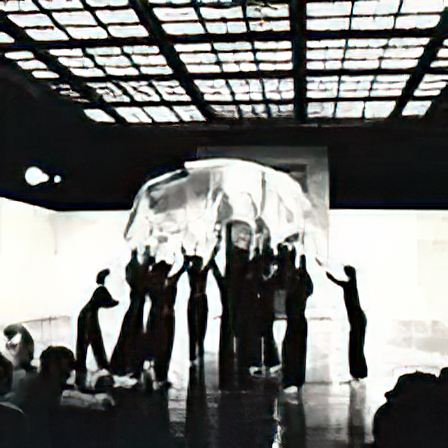
Another use of the Art Gallery space
First, John Cage was not present at the concert of his work "Variations VI" given at Mills College (Oakland, California) on January 16. It was unusual in so many aspects I hardly know where to start. I guess the physical space is as good a place as any. As you may or may not know, Mills has a perfectly good auditorium that they regularly use for music. This wasn't held there. It was in an art gallery that had absolutely nothing in the space except: (1) some pillows, (2) synthesizers and other electronic gadgets, (3) long tables in a square to define a central performance space, and (3) what seemed like hundreds of patch cords draped over rolling clothing racks.

This is why the racks of patch cords–the Buchla 100 Series
Walking into this space was like visiting an alien landscape. It was like no concert I've ever seen before or since. Although Cage was not there, his collaborator David Tudor was, along with other electronicists. People (audience) were lining up along the walls around the performance space, some sitting on the floor. The pillows were taken. The floor was too hard to spend the entire concert sitting on it, so Mel and I wound up walking around as the musicians performed.
Pioneers of a New Musical Frontier
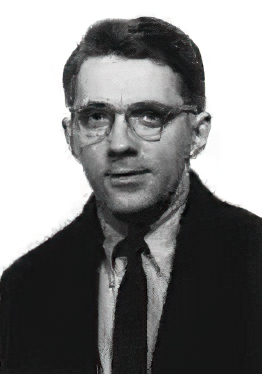
David Tudor, electronicist
Sometimes many performers were playing, sometimes a few. Knowing Cage's compositions, we could have predicted that there would be many silences. Sometimes there would be only one sound from one synthesizer or other electronic or electrical device, surrounded by silence.
I would not have known the Buchla 100 ("Music Box" above) had I not seen it before. I don't remember exactly when, but it must have been in 1965 I was hanging out at intermission in the tiny lobby of the San Francisco Tape Music Center on Divisidero and noticed that composer Morton Subotnik was standing near a small table they used for taking cash and dispensing tickets, then empty. A man I had never seen before came in with something under his arm that he deposited on the table. It looked like one of the two modules shown above, like a tiny telephone switchboard but with something like a keyboard showing.
I remember that I was close enough to hear the man carrying it (turned out to be Donald Buchla himself) explain that the metal strips that looked like keys did not depress but responded to a hovering finger. The expression on Subotnik's face was priceless, and I remember that he literally jumped for joy. I later learned that this meeting constituted the delivery of a piece of equipment commissioned by Subotnik and Ramon Sender of the Tape Music Center and paid for ($500) by a Rockefeller Foundation grant.
I know, I'm weird, but I enjoyed the music in the gallery tremendously and hungrily watched the patch cords as they were deployed on different instruments by different performers. Tudor was the only one I could recognize in the mix of (mostly) men dodging back and forth from the hanging cords to the instruments. Here is the list of performers from the front of the program: Tudor, Martin Bartlett, Charles Boone, Anthony Gnazzo, William Maraldo, Edward Nylund, Judy Ohlbaum, Ivan Tcherepnin, and Ron Williams. Unfortunately for those of us who are mad for tape and electronic music, the instruments were not identified.
The Future of Music
I tell you all this, because music is changing. Although I don't expect much change (especially for some years) in traditional orchestras, some part of musical performance won't ever be the same again. The Moog synthesizer and Buchla Box (for instance) on display at this concert are prototypes of instruments of the future. The future ones won't look the same, because these are too hard to play as they are if you aren't an electronics engineer. (Hence the patch cords–on most there are no keys that depress, no place to blow, nothing to bow or pluck.) At least some of the music of the future will be very different, but I'm sure I will still enjoy it. This music in this performance? 10 out of 10!
Book Review of an Illicit Pamphlet
On to the second review, of a book by poet Lenore Kandel that has been out since 1966. It's very hard to obtain, because it keeps getting confiscated by police as obscene. Unlike some religions, our Protestant Christian variety has no place for sacred sexuality (although Kandel read some excerpts from Roman Catholic mystics at her trial).
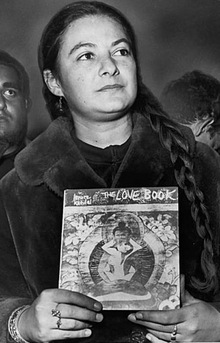
Lenore Kandel with Her "Book"
Her The Love Book is a small pamphlet of poetry (8 pages of 4 poems) that treats religious sex seriously ("sacred our parts and our persons"), using some ordinary and some made-up words, but also many words and phrases that are believed to be anathema to polite society because they do not disguise the activities they extol.
What can I say about these well crafted turn-ons that I finally managed to find for sale? Only that they harm no one, are meant for adults, and display a reverent, eccentric beauty. Since Kandel's tiny paper booklet started being repeatedly ripped off by the authorities, sales have increased anywhere the book could be found. Kandel's reaction? In thanks to the representatives of authority, she contributes 1% of her proceeds to the Police Retirement Association. As for this book–like the music, once I was able to get hold of it I experienced it as 10 out of 10 for its rare, raw, honest description and exaltation of feelings.
I hope myself to have a book of transcribed interviews on female sexuality coming out, but it might not be for a year or two. Maybe I'll need to get a guest to review it for me.
Toodle-oo till next time,
Vicki

by Victoria Lucas
Those of you who have followed the" adventures of Mel and Vicki" may remember that my man Mel and I–in a brief time–moved from San Francisco to New York, spending 3 months there, then moved back to the Bay Area, to Berkeley. We enrolled our relative in Berkeley High School, from which he is graduating. In my last missive, I recounted a short tale of why we were about to leave Berkeley following the terrible assassination of Dr. King, hoping to leave behind the physical violence and violent rhetoric that seemed to be taking over the community we had known as peaceful.

Fortuna, California
I am writing to you from a small town north of San Francisco called Fortuna ("fortune" or "good luck" in Spanish), where Mel and I are working as "temps" (temporary workers) for the County of Humboldt while we look for a home to buy with the proceeds of the house belonging to my mother, who died in late 1966. Our relative did not yield to persuasion but is insisting on staying in Berkeley following graduation, living with friends.
All that is background for my reviews today of 2 television shows that I probably would not have seen in either Berkeley or New York because I wouldn't have known about them. I recommend to you "Misterogers' Neighborhood" and "Laugh-In," the first a public-television offering, and the other a crass, commercial (and extremely funny) show.

Fred Rogers
"Misterogers Neighborhood" is a children's show. Although Mel and I have no children (together), we have friends here who do. We have no television either, but I happened to be at one place with kids one day when they were plopped on the floor in front of the TV watching a man whose real name is Fred Rogers, talking slowly and introducing them to what I learned are stable personalities on his show, including puppets he voices and actors who speak for themselves.

Trolley to Make Believe
Some actors and puppets portray personalities in a carefully separated make-believe area accessible via a trolley car. Once the trolley has reached the make-believe kingdom, Rogers disappears except for his voices for the puppets, and the puppets and an actor take over. I say "carefully separated," because this is deliberate: Rogers wants the children who watch his show to clearly see and understand the difference between make-believe and real. In the "real" part of the show, for instance, an actor portrays a postman who not only delivers "mail" but interacts with Rogers about real things.
The show I happened to catch was pretty mundane, but our friends told us about the first show on February 19, the very first by Rogers to be broadcast nationally on NET (National Education Television). It involved a protest against war, unlike the ones in which Mel and I and our friends had been involved in both Berkeley and New York, and held in the land of make-believe, but an antiwar protest, nevertheless.

King Friday XIII
In the land of make-believe reigns a puppet king, King Friday XIII. This king becomes a despot and tries to suppress all differences of opinion while he makes war on progress. The inhabitants of the "land" object and send balloons to the castle tied to messages of love and peace. King Friday immediately capitulates and declares the war over.
May I remind you that this is a children's show?
Live, from beautiful downtown Burbank…

Dan Rowan
The war also is definitely more than mentioned in another show I found out about in a whole different way. With no TV to watch in the evening, my FM radio found a place of honor in our tiny living room. Spinning the dial one night I found laughter. Needing some of that, I listened while relaxing in what has become my bed for probably the duration of our stay in Fortuna–an easy chair in which I have to sleep sitting up due to my asthma (an allergy to redwood sawdust).
Imagine my surprise when I discovered that what I was listening to is a television show called "Laugh-In" starring comedians Dan Rowan and Dick Martin, who mock the president, the generals, politicians, and others who support the war in Vietnam. They are assisted in their madness by Henry Gibson, Arte Johnson, Judy Carne, Gary Owens, Ruth Buzzi, Joanne Worley, Goldie Hawn, and many more. My husband Mel is an engineer and wasn't surprised at all, knowing as he does the electromagnetic spectrum in which "radio waves" lie. FM radio signals overlap with the part of the spectrum in which television operates. Local channel 6 is FM 87.9!

Dick Martin and friend…
Imagine also that I have to imagine all the sight gags. If you've seen the show you know there are a lot of them, but I know about them only from the silences followed by laughter. I only hope that someday I can actually see the show and enjoy the physical humor as well as the spoken jibes.

I'm sure it'd be "Very Interesting"
"Laugh-In" is funny, irreverent, and up-to-the-minute. I hope it survives many seasons and maybe even has some real-world effects. If I were handing out stars, I would give both these shows 5 out of 5. They are the most progressive shows I have (not seen, um . . . ) experienced on television!
Bye for now, and happy watching!

This article was pre-recorded so the writer could tune in to Laugh-In…

by Dana Pellebon
On April 4, 1968, my world changed and I wasn’t even aware of how much. My day was as any other. Go to work, come home, make dinner, do a little reading, and go to bed. Yet, on April 5th, the horror of opening my newspaper made my world stop. Front Page. Dr. King Murdered. As the paper slipped from my hands, gravity took my body and the tears now flowing to the floor. Who? How? I tried to read the words on the now wet pages, but I couldn’t escape the feeling of intense pain and sadness. When you’ve lived through a man shepherding you and the world through progress, what does it mean when he’s not here? I ached for his wife and children. I dreaded the moment I had to move my body to figure out what was next.

Civil rights leader Andrew Young (L) and others on balcony of Lorraine motel pointing in direction of assailant after a shot mortally wounded Dr. Martin Luther King, Jr. Photograph by Joseph Louw
Somehow I got off the floor to ready myself for work. The bus there was filled with other Negroes like me silently crying. At the next to last stop downtown, a small group of men came on the bus and were very loud about ridding the world of another one of “them”. I straightened my head, methodically dried my tears, and looked right in their direction. My steel gaze was met with some chagrin on their part and blessed silence. It was in that moment that I knew I would never let another one of them see me cry ever again.
I hear there is a work strike coming up. Already people are mobilizing. There’s rumblings on the radio about the riot in Memphis and DC. I read the words of Robert Kennedy talking about his brother’s death and how he too was killed by a white man. How we should not take this time for violence but instead for compassion. I want to take in these words of reconciliation but my heart is cold and distant from such talk.
I believed in the dream of Dr. King. Nonviolence begets understanding and peace. He may be targeted but he was special. Malcom X was killed because of who he was. Dr. King would stay alive because of who he was. Or, so I thought. My naïveté was on full display as I realized that him dying was the only inevitable outcome for whites who hated his message. My new understanding that peace and conflict are natural bedmates. As I step into this world without Dr. King, I must ask myself, what is next?
This is the question for the Negro. Without our great Shepherd, how does this flock move through the pasture? Who leads the next part of the movement? What legacy of his can we grab of our own to continue to shape the world into a just and equitable future? I don’t know what the path forward is and how to get there, but I think of the last words Dr. King said the night before he was murdered and I know in this moment and the next and the next, every thing I do will be to realize the vision of our collective promised land.
“Like anybody, I would like to live a long life. Longevity has its place. But I'm not concerned about that now. I just want to do God's will. And He's allowed me to go up to the mountain. And I've looked over. And I've seen the promised land. I may not get there with you. But I want you to know tonight, that we, as a people, will get to the promised land. And I'm happy, tonight. I'm not worried about anything. I'm not fearing any man. Mine eyes have seen the glory of the coming of the Lord.”

Dr. King, giving his last speech at Mason Temple, Memphis, on April 3.

by Jessica Dickinson Goodman
When morning finds me, I read the newspaper. Earlier and earlier these days, as my newborn moves towards infancy and begins to make his own dawn schedule.
It was one of Will Roger’s favorite lines: “All I know is just what I read in the papers.” As a Cherokee man born in land that was treaty promised and greed taken, he knew better than most how wrong the press can be. But still, it’s the only first draft of history many of us are privileged to see.
Which is what makes reading it while nursing my baby so strange some days. Like a few weeks ago, when, on a single page, these were the headlines:

On mornings like this when decency weeps, a page like that perhaps only has one or two truly true things in it. One, I suspect, is from the "Commission" report breathlessly exaggerated in the headlines, whose full and proper title is “Report of the National Advisory Commission on Civil Disorders;” that commission includes the former Illinois governor Otto Kerner Jr., leading Congressmen from both parties, and Atlanta Police Chief Herbert Jenkins. The paper says of the report:
There’s a lot of passive voice in there, unfortunately common with newspapers’ coddling of police officers’ egos (see the unsourced and useless sob piece in the bottom left hand corner). But those “sniping incidents” included a mother shot in the back and murdered inside her own home during a riot as she tried to pull her 2 year old to safety, away from the glass window.
I hold my baby tighter as I read that.
In another powerful moment, the paper says:
'We want people to see this as we did. We thought we had to tell it like it is.'
Another commissioner returned from a ghetto inspection tour and switched his position on one issue, remarking:
'I'll be a son-of-a-gun. You might be 99 miles further to the left than I thought I would be.'"'
Another bit of truth came from Dr. Martin Luther King Jr, as it so often does. He called the report “a monumental revelation of what we had seen since the burning fires of Watts.”
The report laid the blame for the riots on centuries of white racism and systemic lack of funding in Black communities. It prescribed deep and meaningful investment in those communities to try to make back some of the time that was stolen (the “billions” listed in the third headline, as if we don’t spend “billions” in Vietnam every year).
Reports of commissions like that are the second, or even third drafts of history. I suspect they get it right more often than they do not.
I heard on the radio last night that Dr. Martin Luther King Jr. was shot and murdered in Memphis. The radio report wasn’t even the first draft of history, maybe just the notes for a future draft. Later, Bobby Kennedy came on, said something like:

Robert F. Kennedy, speaking in Indianapolis, April 4.
I don’t know what the headlines will read today or tomorrow or when the killer is caught, if he is caught. A lot of people hate Dr. King, blame him for the riots. God knows the newspapers did in their first drafts. But reports like the Kerner Commission, they tell us the true causes, lay blame at the right doors.
Until then, until we know more about what happened than we read in the newspapers, I’ll stick with Senator Kennedy, who knows at least something about surviving deaths by violence. I'll try to find some wisdom in the awful grace of God. I’ll try to think about one of Will Roger’s other great quotes, “It's not what we don't know that hurts. It’s what we know that ain’t so.”
I’ll keep trying to teach that to my baby, the things I thought I knew from the papers that I now know aren’t so. I'll try to tell it like it is, as much as I can for someone of his small size. And I'll hold him just a little tighter.

by Mona Jones
My husband calls me from the living room. Any other day, I might think him or Big Mama needed a drink of water. But something about his voice sends a shiver down my spine. He calls me again.
“Mona, you better get in here.”
I walk into the living room just in time to hear a recording of Robert Kennedy over the radio say, “Some very sad news for all of you and, I think, sad news for all of our fellow citizens and people who love peace all over the world. And that is that Martin Luther King was shot and was killed tonight in Memphis. . .”
The rest of his words are drowned by the deafening cries of those in attendance of his last-minute press conference. Mabel must sense a change in the air because she leaves her uncle in the kitchen to come wrap her skinny little arms around my waist. “Mama, what’s wrong? Did something bad happen?”
She’s looking up at me for answers and I have no idea what to say. Even if the cries of the people on the air hadn’t drowned on Mr. Kennedy’s voice, I’m sure the blood rushing in my ears would’ve done the same. Thomas walks up to stand in the archway with me as Mr. Kennedy keeps talking.
“Martin Luther King dedicated his life to love and to justice between fellow human beings. He died in the cause for that effort.”
Even from our little home in Indianapolis, I can already imagine the streets of my hometown in D.C. filling with people with a whole lot of rage and hurt with nowhere to direct it but at themselves. I clutch my little girl closer to my side.

“On this difficult day and in this difficult time for the United States, it’s perhaps well to ask what kind of a nation we are and what direction we want to move in.”
Hasn’t this country already chosen? A great man was killed tonight, I think as my lips tremble and my eyes well up with hot tears. I don’t feel like a mother or a wife or even a sister right now. I feel like a child clinging to another child trying to figure out what’s gonna happen now that the one person who was allowed to care isn’t allowed to care anymore.
“For those of you who are Black – considering the evidence evidently is that there were White people who were responsible – you can be filled with bitterness and with hatred and a desire for revenge.”
Sounds of people yelling and crying echoes around the neighborhood. I fear it's only gonna get worse. I only hope that Thomas doesn’t get any ideas about running out there to help or hurt. He may not have agreed with the Reverend’s methods, but I could see it on his face that he was feeling it, too, plus all the anger that rushes out from inside of him whenever the position of Black people in this country comes up.
“We can move in that direction as a country. . .”
Easy for him to say. He’ll wake up tomorrow and still be a White man. We’ll wake up tomorrow and be Black people without a leader. We’ll wake up not knowing what tomorrow is gonna bring. If the Reverend Martin Luther King was killed, what’s gonna happen to us if we speak out? I can’t tell where this country is headed, and neither can Mr. Kennedy. But I have a feeling it’s nowhere good. Nowhere good at all if a man like that can be taken from us so very, very soon.

by Victoria Lucas
Mel and I grieve that Martin Luther King, Jr. has been taken from us. The turmoil of the day only underscored the tragic events.
It’s not like NYC where mimeographed newsletters were hurried out to the streets with the hour’s news—it takes time for the Berkeley Barb or other newspapers to be ready to distribute. What a difference a Gestetner makes.
Thus, it’s quite possible to drive into something unexpected, as we did on the day of the assassination. People glared at us, yelled at us, even threw things until we stopped and asked someone what was going on. It seems we were supposed to have known to place a black ribbon on our radio antenna or someplace else on our car, as a memorial to Dr. King. We had no idea. We hurriedly found a ribbon and attached it.

Berkeley during the Free Speech Movement a few years ago.
The lack of timely information and the increasing violence here are driving us out. Not only are the police getting more violent, but the Panthers are violent, the protests are getting violent; I cannot pass UC Berkeley's Sather Gate without seeing and hearing a male speaker getting purple in the face about “the pigs” (which now includes both the police and the UC Berkeley administration). What’s more, we're finding we cannot drive or walk around Berkeley at all and feel safe.
And so, we shall soon be leaving tumultuous Berkeley for points north. Our family member is staying, so we will be back to check on him and see friends. But living here has become too scary.
Maybe everywhere has gotten a little more scary.

by Joe Reid
Dr. King was loved by many for what he did with his life. I thought I loved Dr. King for what he did, but I think that I really must not have. For the thing I called love was ineffective and unhelpful. It was empty in that it let another carry a burden alone, without me stepping forward to help. While this man was walking around doing for others; walking around with a bullseye painted on his back, I only looked out for myself and mine. It was good that Dr. King was doing the work of leading protests. Organizing folks. Giving speeches to inspire others. Writing books so that others might understand our struggles. All that I did was say that I loved his work, but I did nothing to help. I worked and took care of my family and had the nerve to call another man brother when I didn’t lift a finger to try to make that man’s life better.
Dr. King was clearly not like me. When he called you sister, it was because he cared about what happened to you. If he called you brother, it was because he saw you as family. He was able to see another man’s struggles as his own and was willing to use what talents he was given to do something about it. When I see another man’s struggles, I see it as that man’s struggles. How does that make me any different than most white folks? People that might not hate me; might not call me a nigger, but who don’t see themselves in me. They don’t see my struggles as their own. Dr. Martin Luther King Jr was not that the kind of man that I have found myself to be. He clearly possessed something that I lack.

Dr. King, flanked (from left) Hosea Williams, the Rev. Jesse Jackson, and the Rev. Ralph Abernathy on the Lorraine Motel balcony in Memphis on April 3. Photo by Charles Kelly.
I think that my problem is that I don’t love God. How could I say that I love God, if I don’t love those who God loves? Like how if you love your friend, you will help your friend's family because of that love. That I am not willing to step away from my own life to take up the cause of another shows me how fruitless my love is. It shows that I don’t love my neighbor, I don’t love my coworker, I don’t love my family, I don’t even love myself. If another man is fighting a battle for me that I won’t fight for myself, then I must not love myself. I really don’t love myself, if I haven’t walked with the man. My inaction proves the point that I must not love God.
Dr. King was not only fighting for negroes in this country, but also for poor folk of all stripes. This man truly loved others. His actions showed that. He loved his children. His speeches showed that. He loved his brother. His hands demonstrated that. Lastly, it is now obvious to me that Dr. King really and truly loved God. His life was a testament to that.
So, if I am going to claim to love God, as this man clearly did, I need to stop seeing people as separate from myself; realizing the truth that if anyone is being denied participation, representation, opportunity, or even their very life, I am being denied those things as well. It was very unloving of me to let others fight on my behalf without me. It’s time for me to start loving God and those who He loves. Dr. King, thank you for your example of how to love. You will be missed, but you will never be forgotten.

by Tom Purdom
I was doing the dishes and listening to our local all-news station, KYW, when the news came over the radio. The first thing that leaped into my mind was Carl Sandburg’s poem Upstream:
The strong men keep coming on.
They go down, shot, hanged, sick, broken.
They live on, fighting, singing, lucky as plungers,
The strong mothers pulling them on,
The strong mothers pulling them from a dark sea, a
great prairie, a long mountain.
Call Hallelujah, call Amen,
The strong men keep coming on.

by Victoria Lucas
March on Washington
They're saying there were 100,000 of us. There were a lot of people, but 100,000?!? It just seems like an exaggeration to make the whole thing look more dangerous to the government than it really was.
We were not armed. We were not aggressive–well, at least not until later at the Pentagon.
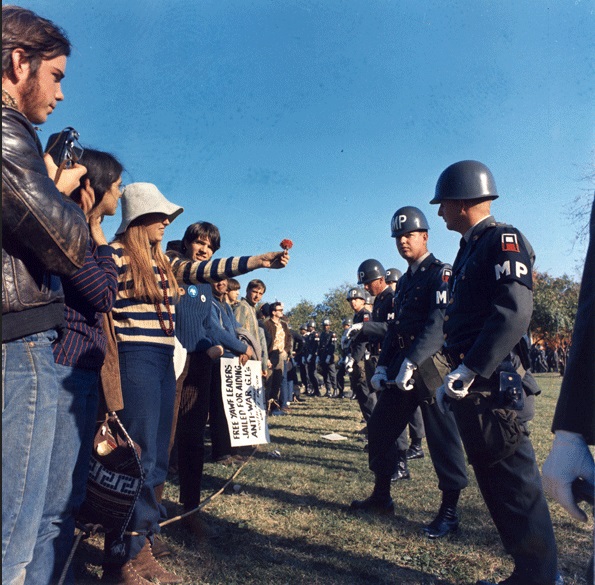
Flower power
Those were flowers that girl put in the barrels of the rifles with fixed bayonets and that were offered to the soldiers, not some black-powder concoction. And it was a sit-in! People at the Pentagon sat down in front of the fixed bayonets.
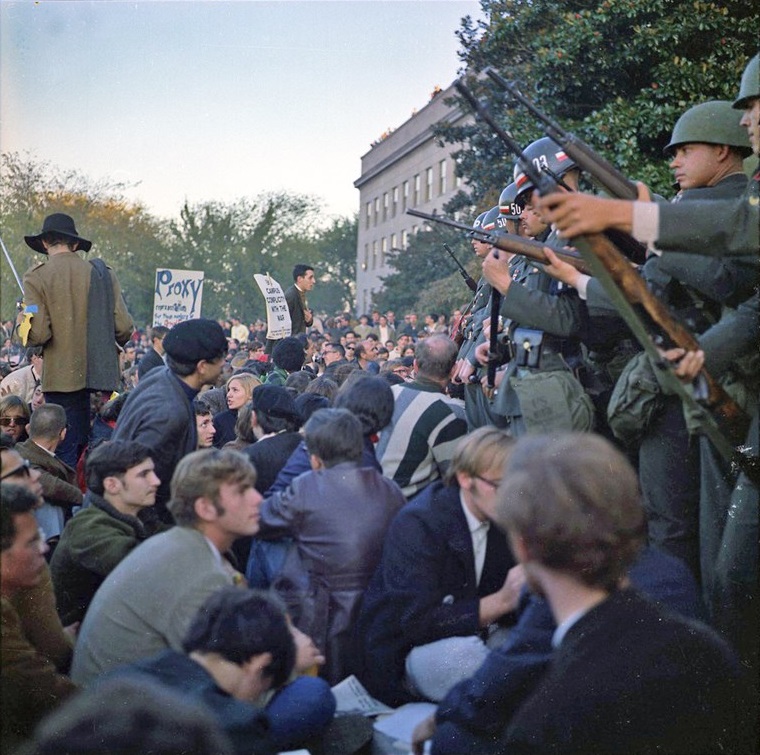
But we didn’t get as far as the Pentagon. OK, let me start at the beginning–our beginning, for Mel and me and our new house guest.
If you have seen my articles these past few months you know Mel and I were living in New York City and planning to travel to Europe. Yes, our plans were a bit vague, and we were enjoying our stay in New York, with Mel working full time at a boiler insurance company and me part time for Aspen Magazine (Phyllis Johnson Glick). In our spare time we walked in parks, visited friends, joined demonstrations against The War, and went to concerts. We also occasionally went on automobile trips on the weekends, retrieving our VW van from a rented garage in New Jersey.
One such weekend not long ago, we went to pick up a family member of Mel’s who had been suspended from high school, and he came to live with us until we could decide what to do. I’m not going to mention his name or other circumstances, because I don’t have his permission to write about him. I will only say that he was living in the US at this time only on the condition that he stay in school, and because that was the bottom line we had to figure out how to get him back in school. We came to the reluctant conclusion that, given the drug-related nature of his suspension, the only likely high school we could get him into was in Berkeley.
So when we drove to Washington, DC for the protest, there were 3 of us, we were loaded down with all the belongings we could bring, and we did not return to New York. We parked as close as we could get to the Lincoln Memorial and spent our time at the Reflecting Pool with the crowds there, trying to keep track of one another. We never crossed the bridge to the Pentagon to attempt the “levitation” people have been talking about.
Yes, levitation. A silly idea, I suppose, but then–like our plans for Europe–expectations were pretty vague. From what I’ve read since, only about half the people who, like us, gathered at the Lincoln Memorial followed Abbie Hoffman to the Pentagon, where it is said 3,000 federal troops were waiting for them. Norman Mailer was there and managed to get himself busted. At the Lincoln Reflecting Pool, the rally was comparatively quiet, given what I’ve heard and read about the Pentagon crush.
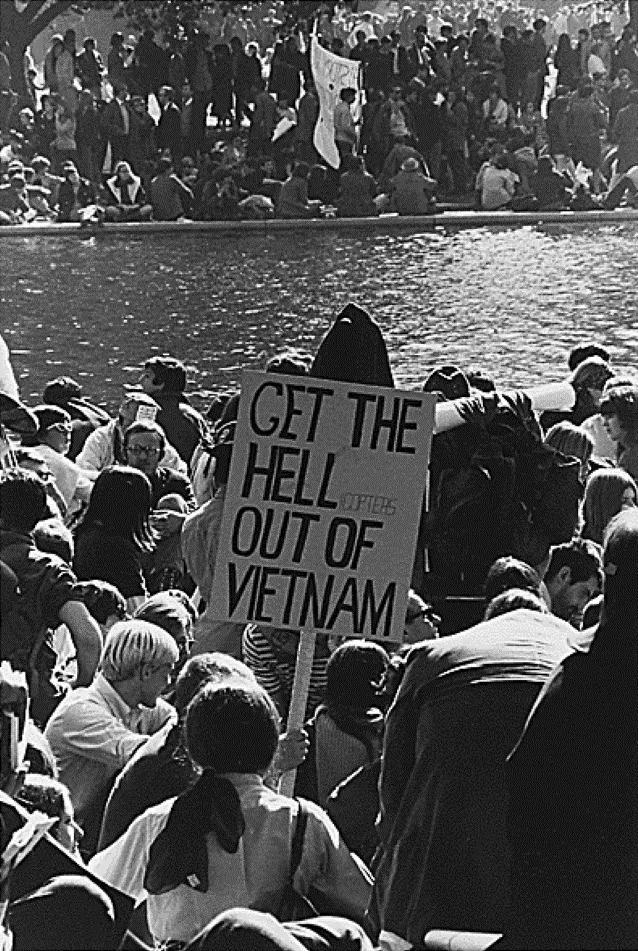
They say a lot of famous people were there besides Hoffman and Mailer–such as Robert Lowell, Noam Chomsky, Paul Goodman, and Allen Ginsberg (who chanted in Tibetan?) as well as rally speakers Dr. Benjamin Spock and Rev. William Sloane Coffin. Unfortunately, ill-conceived attacks at and foray into the Pentagon by some resulted in bloody confrontations, and the protest did not end as peacefully as it began–or so I hear and have read.
Wagons West
Since we wanted to get to a campground to stay the night, we left early. You see, Mel had to quit his job to leave New York, and so did I. We had only our savings to go on, and we were going to be roughing it for the trip back to the West Coast. We plotted our journey by where we could find campgrounds for each night, and we cooked our food from the sort of large drawer on top of the van that Mel had built on weekends and days off in that New Jersey garage. It was closed in a watertight case on top, but once pulled down at the side of the van there were shelves holding a camp stove, a lantern, canned foods, a couple of pots and pans, etc.–a kitchen and pantry all in one. A table folded out from being a cover to the drawer and held the camp stove and provided a spot to prepare food. Quarters were tight, but campgrounds gave us room to spread out, although it got pretty chilly.
We haven’t accomplished much in Berkeley yet, but we have found an apartment and are sending our family member–-let’s call him Mervyn–-to Berkeley High. (He doesn’t have long before he finishes school.) I found a full-time, daytime nanny job with a Mrs. Kurzweil, who has a sweet little guy, not walking yet, so not a year old. And we are connecting with old friends from the pre-New York days, spending some time in San Francisco.
We are still connected with the protest movement, and I’ve found new concert venues. Next time–adventures in Berkeley! (I love Tilden Park.)


by Victoria Lucas
Definitions
The dictionary says there are two definitions for the word "transport." One definition we could use daily. A sample sentence might read, "The bus was my means of transport to the 5th Annual New York Avant Garde Festival."
Definition number 2 is quite different: "I was transported when I got on the ferry, but it wasn't by the transportation!" In this sense, one is overwhelmed with pleasure, joy, excitement, all those good things. How do you combine the 2? Why, at an annual New York Avant Garde Festival held on a ferry, of course–in this case the John F. Kennedy. 
Whee! Here we go. This was the list that got me going:

Charlotte Moorman, Producer
Right there at the top is the producer, Charlotte Moorman. Earlier this year Moorman was arrested and convicted of obscene behavior for playing the cello topless, apparently in compliance with the musical notation of a piece by Nam June Paik, one of the composers listed underneath the festival title. Fortunately the Commissioner of Marine and Aviation didn't know that when Moorman went to apply for a permit to use the ferry boat as a stage for dance, music, painting, happenings, etc. She got the permit, and when it was questioned by the press, the Department stood by their decision (bless them), and the festival went on.
She has been producing these festivals since 1965. Never a strident feminist (not that there's anything wrong with that), she has charted her course to be with like-minded musicians and performers, and she decided that it was pretty useless to have little concerts for herself and her friends–better to at least try to introduce the "avant garde" (read "strange") to an unsuspecting audience. Just look at the list of names! Allan Kaprow, Takehisa Kosugi, Jackson Mac Low, Max V. Mathews (Bell Labs electronic music!), Max Neuhaus, Sun Ra! And those are just the performers! Here is the program, listing the composers, painters, and so on:

Note, among others: Max Neuhaus, La Monte Young, John Cage (Yes!), Robert Moran (they played one of my favorite pieces, "L'apres midi du dracoula"), Robert Ashley, Toshi Ichiyanagi, Alvin Lucier, Karlheinz Stockhausen, with films by Stan Brakhage and "hopefully by" my favorite filmmaker Bruce Baillie, as well as Shirley Clarke and Ben van Meter. Con Edison lent them cables to use for all the electrical and electronic appliances/instruments, and somehow the Judson Memorial Church (where I went to see John Cage) was involved.
We were crushed!–uh make that IN a crush
Even after seeing partial lists of the performers and creators, I was not, however, prepared for the unique part of this experience. I've seen some of these people, heard their music, seen their work, read about them elsewhere. They and their work are available elsewhere. On the ferry, they were available right in front of me. Sometimes I could hardly get past them, the ferry was so crowded (holds 3,500, and that doesn't count the cars on the lower deck). There were dancers on the outside benches moving with a rope among them; Paik had televisions stacked on one another and on pedestals; a painter made room to paint in one area, a jazz combo to play in another. You could hardly move for the musicians, composers, painters, dancers, readers, poets, filmmakers, and all manner of creative men and women. "Excuse me, Mr. Ginsberg, could I get by you? I really need the john." Yes, Ginsberg did plan to be there. On a larger, longer, bluer than blue program for the event, his name is signed along with that of John Cage, Yoko Ono, and 107 others!
Here's how it went: Mel and I arrived and pushed our nickels into the turnstile slots. I can't remember what time we got there or how long we stayed. We probably stayed until the evening, not too late, because we don't want to be on the mean streets too late. We made our way onto the boat but there was no place to sit. We wandered around separately–a painting here, Nam June Paik's electronic display there. It really was shoulder to shoulder sometimes. I paid little attention to anything outside the boat. I think Mel tapped me on the shoulder at one point and led me outside so we could look at the Statue of Liberty. There were dancers outside, but no music. I was soon back indoors listening to music.
Come to think of it, I probably wouldn't have recognized most of the people on the program if they had addressed me personally. I know what Cage looks like, and he wasn't there when we were–or I couldn't find him in the press of people. I might have seen Nam June Paik adjusting the TV sets he piled one on the other. I have seen pix of Allan Kaprow and Yoko Ono–and I could maybe recognize a few others. But I didn't go to recognize people. I went to listen and look and be immersed in art and music. (I wasn't interested in the particular choreography on offer, but in reviewing the whole happening I would give it as many stars as I could reach.)
Back we went through the turnstiles and turned around and plunked in another nickel each and back into the crowd aboard. We were not allowed to stay on the boat. When it docked, we had to get off and pay for another ride. It was a routine–push our way through crowds to get on the boat, move around in it, 25 minutes later the boat docks, we get off and take the ride on the turnstiles, plunking the nickels (good thing we brought a supply) and getting on again, only to get off on the other side. It's a wonder we weren't dizzy. Actually, I think I was–dizzy with joy in art and music: Transported!
